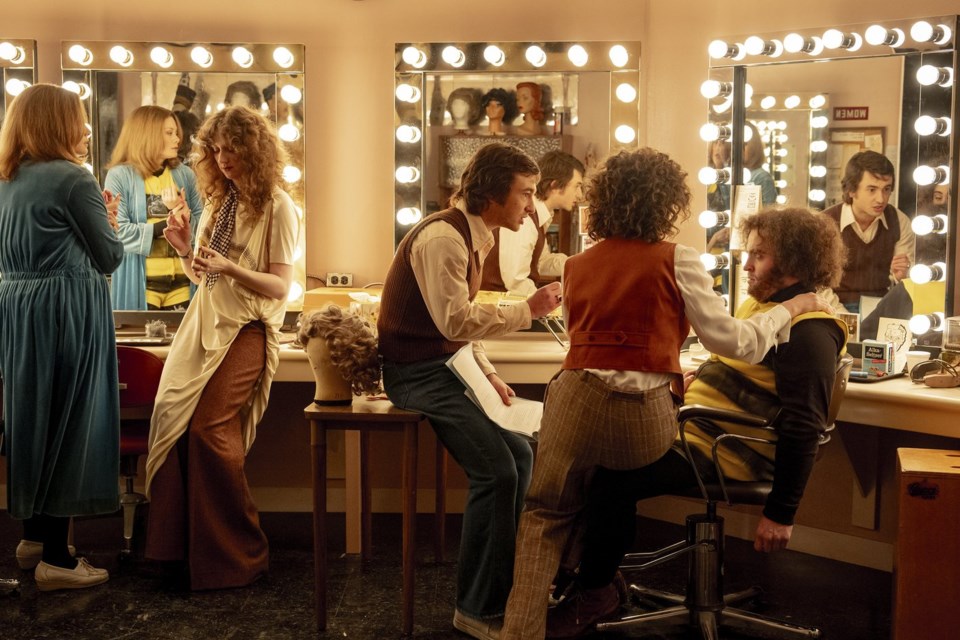We are at the apex of . Now entering its 50th year, ŌĆ£SNLŌĆØ has never been more unquestioned as a bedrock American institution. The many years of cowbells, Californians, mom jeans, Totino's, unfrozen caveman lawyers and vans down by the river have more than established ŌĆ£SNLŌĆØ as hallowed late-night ground and a comedy citadel.
So itŌĆÖs maybe appropriate that Jason ReitmanŌĆÖs big-screen ode, should arrive, amid all of the tributes, to remind of the show's original revolutionary force. ReitmanŌĆÖs film is set in the 90 minutes leading up to showtime before the first episode aired Oct. 11, 1975.
The atmosphere is hectic. The mood is anxious. And through cigarette smoke and backstage swirl rushes (Gabriel LaBelle), whoŌĆÖs trying to launch a new kind of show that even he canŌĆÖt quite explain.
ŌĆ£Saturday Night,ŌĆØ which opens in theaters Friday and expands in the coming weeks, isnŌĆÖt a realistic tick-tock of how Michaels did it. And, while it boasts a number of fine performances, I wouldnŌĆÖt recommend it for anyone hoping to see an illuminating portrait of the original Not Ready for Prime Time Players.
No, ReitmanŌĆÖs movie is striving for a myth of ŌĆ£Saturday Night Live.ŌĆØ MichaelsŌĆÖ quest in the film ŌĆö and though he never strays farther than around the corner from 30 Rock, it is a quest ŌĆö is not just to marshal together a live show on this particular night, it's to overcome a cigar-chomping old guard of network television. (Milton Berle is skulking about, even Johnny Carson phones in.) In their eyes, Michaels is, to paraphrase Ned Beatty in ŌĆ£Network,ŌĆØ meddling with the primal forces of nature.
In mythologizing this generational battle, ŌĆ£Saturday NightŌĆØ is a blistering barn-burner. In most other ways (cue the Debbie Downer trombone), itŌĆÖs less good. Reitman, who penned the script with Gil Kenan, is too wide-eyed about the glory days of ŌĆ£SNLŌĆØ to bring much acute insight to what was happening 50 years ago. And his film may be too spread thin by a clown carŌĆÖs worth of big personalities. But in the movieŌĆÖs primary goal, capturing a spirit of revolution that once might have seized barricades but instead flocks to Studio 8H, ŌĆ£Saturday NightŌĆØ at least deserves a Spartan cheer.
A clock ticking down to showtime runs as ominously as it might in ŌĆ£MacGruberŌĆØ throughout ŌĆ£Saturday Night.ŌĆØ Nothing is close to ready for air. John Belushi (Matt Wood) hasnŌĆÖt signed his contract. Twenty-eight gallons of fake blood are missing. And, most pressing of all, the network is poised to air a Carson rerun if things don't take shape. An executive pleading for a script is told, ŌĆ£ItŌĆÖs not that kind of show.ŌĆØ
What kind is it? Michaels, himself, is uncertain. HeŌĆÖs gathered together a ŌĆ£circus of rejects,ŌĆØ most of them then unknown to the public. There is (Ella Hunt), Chevy Chase (Cory Michael Smith), Garrett Morris (Lamorne Morris), Jane Curtin (Kim Matula) and Dan Aykroyd (Dylan OŌĆÖBrien). Also in the mix are Jim Henson (Nicholas Braun), who spends much of the movie complaining about the untoward things the cast has been doing to Big Bird, Andy Kaufman (Braun again), Billy Crystal (Nicholas Podany) and the nightŌĆÖs host, (Matthew Rhys).
Most of them pass too quickly to make too much of an impression, though a few are good in their moments ŌĆö notably Smith, playing up ChaseŌĆÖs braggadocio, OŌĆÖBrien and Morris. Garrett Morris, the cast's lone Black member, is in a quandary over his role ŌĆö because of his race and because he was a playwright before being cast. Though ŌĆ£SNLŌĆØ was revolutionary, it hardly arrived a finished product. Morris here is a reminder of the showŌĆÖs sometimes ŌĆö and ongoing ŌĆö not always easy relationship to diversity, in race and gender.
It also wasnŌĆÖt always such a break from what came before. When Chase faces off with Berle in a contest over ChaseŌĆÖs fiancee, Jacqueline Carlin (Kaia Gerber) ŌĆö one of the movieŌĆÖs few truly charged scenes ŌĆö they seem more alike than either would like to admit.
ItŌĆÖs not a great sign for ŌĆ£Saturday NightŌĆØ how much better the old guard is than the young cast. Along with SimmonsŌĆÖ Berle is Willem DafoeŌĆÖs NBC executive David Tebet. He provides the movie its most ŌĆ£NetworkŌĆØ-flavored drama, seeing ŌĆ£a prophetŌĆØ in Michaels and, despite wavering skepticism, urging him to be ŌĆ£an unbending force of seismic disturbance.ŌĆØ Also in the mix ŌĆö and a reminder that the suits had newbies, too ŌĆö is Dick Ebersol (a refreshingly genuine ), a believer in Michaels but only up to a point.
Ultimately, this is MichaelsŌĆÖ show, and heŌĆÖs played winningly by even if the characterization, like much of ŌĆ£Saturday Night,ŌĆØ is a little thin. Sometimes by his side, as he races to get the show ready is the writer and MichaelsŌĆÖ then-wife, Rosie Shuster (the excellent Rachel Sennott), who you want more of.
It seems to be an unfortunate truth that dramatizations of ŌĆ£Saturday Night LiveŌĆØ inevitably kill it of laughter. ThatŌĆÖs true here just as it was in Aaron SorkinŌĆÖs ŌĆ£Studio 60 on the Sunset Strip.ŌĆØ The exception to that, of course, is Tina FeyŌĆÖs ŌĆ£30 Rock,ŌĆØ which was smart enough to abandon all the ŌĆ£SNLŌĆØ mythology and focus on whatŌĆÖs funny.
This ŌĆ£Saturday NightŌĆØ may have a legacy of its own; a lot of this cast, I suspect, will be around for a long time. And, ultimately, when the show finally comes together, itŌĆÖs galvanizing. The cleverest thing about ReitmanŌĆÖs film is that it ends, rousingly, just where ŌĆ£SNLŌĆØ starts.
ŌĆ£Saturday Night,ŌĆØ a Columbia Pictures release is rated R by the Motion Picture Association for language throughout, sexual references, some drug use and brief graphic nudity. Running time: 108 minutes. Three stars out of four.
Jake Coyle, The Associated Press



